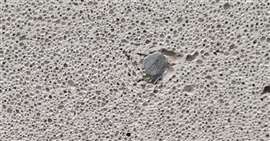Three failures of RAAC concrete in UK schools prompted government action
05 September 2023
 A RAAC panel in cross section (Image supplied by Loughborough University)
A RAAC panel in cross section (Image supplied by Loughborough University)
Three failures of “non-critical” reinforced autoclaved aerated concrete (RAAC) in English schools discovered over the summer prompted new guidance of the material in education settings.
That’s according to a statement released by the Education Secretary Gillian Keegan yesterday.
Last week, the UK government advised 104 schools and colleges to take spaces that are known to contain RAAC out of use if they have not already done so, disrupting lessons for some pupils at the start of the academic year.
Keegan said that the government was taking a “deliberately cautious” approach to safety.
The Department for Education (DfE) sent out a questionnaire in 2021 to 22,000 schools in England to ask them to identify whether or not they had, or suspected, RAAC.
In September 2022, it started a programme where DfE sends a professional surveyor to assess whether RAAC is present.
Three failures of RAAC
The questionnaire meant that the government discovered details of three new cases over this summer, where RAAC that would have been graded as non-critical had failed without warning.
Keegan said, “The first of these was in a commercial setting, the second was in a school in a different educational jurisdiction.
“And in this instance the plank that failed remained suspended, resting on a steel beam. As the plank was fully intact, the DfE engineers were able to investigate the situation.
“In their professional judgement the panel affected would have been previously rated as ‘non-critical.’ Ministerial colleagues and I were already extremely concerned, then a third failure of RAAC panels occurred, at a school in England in late August.
“This was a panel that had previously been graded as non-critical. Because children’s safety is our absolute priority, and it was right to make the difficult decision to change our guidance for education settings so that areas previously deemed to contain non-critical RAAC are now being closed.”
Keegan added that the government would publish a list of schools once mitigations are in place.
The presence of RAAC in public buildings across the UK has been a persistent challenge for several years and rose to prominence in 2018 after a sudden roof collapse at a primary school.
Separately, the UK government has also committed to rebuild seven structurally unsound hospitals containing RAAC.
To read more about RAAC and why its presence in buildings has become such a problem, click here.




